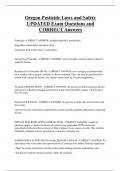Oregon Pesticide Laws and Safety
UPDATED Exam Questions and
CORRECT Answers
Pesticides - CORRECT ANSWER- include herbicides, insecticides,
fungicides, rodenticides, and many other
substances used to kill, harm, or repel pests.
General Use Pesticides - CORRECT ANSWER- may be bought over the counter without a
pesticide license.
Restricted Use Pesticides (RUPs) - CORRECT ANSWER- are a category of products that
pose a higher risk to people, animals, or the environment. They can only be purchased by a
person with a pesticide license; use requires supervision by a licensed applicator.
Pesticide CERTIFICATION - CORRECT ANSWER- the process of demonstrating a person
knows how to handle and apply pesticides in a safe and responsible manner. valid for up to
five (5) years
Pesticide LICENSING - CORRECT ANSWER- the process to obtain the actual license that
shows that
a person has met certification requirements to make specific pesticide applications under that
license.
PRIVATE PESTICIDE APPLICATOR LICENSE - CORRECT ANSWER- needed to
purchase, apply, or supervise the use of restricted-use pesticides (RUPs) on land in
agricultural production that a person, or their employer owns, leases, or rents. This includes
farmland, rangeland, forests, greenhouses, nurseries, orchards, etc.
IMMEDIATELY SUPERVISED Pesticide TRAINEE LICENSE - CORRECT ANSWER- for
individuals who work under the supervision of a Commercial or Public Pesticide Applicator.
• Must be on-site at all times with the trainee when making pesticide applications, and
• Be able to reach the trainee's location within five minutes.
, • No required exam
Trainees may only make applications within their supervisor's categories.
• The supervising applicator is responsible for training the Immediately Supervised Trainee
PESTICIDE APPRENTICE LICENSE - CORRECT ANSWER- individuals who work under
the supervision of a Commercial or Public Pesticide Applicator.
• The supervising applicator does not need to be onsite when the apprentice is making
pesticide applications, BUT the apprentice must be able to reach the supervising applicator at
all times.
• The Pesticide Apprentice is not a certified applicator. In order to renew this license, beyond
the first year, the apprentice will need to attend eight (8) hours of approved continuing
education classes. The eight hours must consist of at least four (4) hours of CORE credits. If
the apprentice does not accrue the required credit hours, they will need to retake the Laws &
Safety exam to re-license.
• Required exam: Laws & Safety Apprentices may only make applications within their
supervisor's categories. The supervising applicator is responsible for training the apprentice.
PUBLIC PESTICIDE APPLICATOR LICENSE - CORRECT ANSWER- required of
employees of federal and state agencies,
counties, cities, municipalities, irrigation districts, drainage districts, soil and water
conservation districts or other special districts, public utilities, and telecommunication
utilities who in the course of their work:
• Use or supervise the use of restricted-use pesticides, (RUPs) and/or;
• Use machine-powered equipment to apply any pesticides (general or restricted)
• Apply pesticides (including organic and 25b products) on the property of any Oregon pre-
kindergarten, public and private K-12 schools, community colleges, federal Head Start
programs, Oregon School for the Deaf, Oregon Youth Authority residential academy, or
education service districts
• Required exam: Laws & Safety and at least one category exam.
COMMERCIAL PESTICIDE APPLICATOR LICENSE - CORRECT ANSWER- Apply or
supervise the application of ANY pesticide (general use, restricted use, organic, and 25b
products) on the land or property of others while employed by a Commercial Pesticide
Operator
IPM - CORRECT ANSWER- IPM is a common-sense strategy that integrates multiple tactics
to reduce pest populations to an acceptable level. Strategies include sanitation, pest exclusion,





